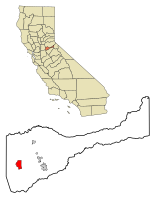Ione, California
| Ione, California | |
|---|---|
| City | |

Main Street in Ione
|
|
 |
|
| Coordinates: 38°21′10″N 120°55′58″W / 38.35278°N 120.93278°WCoordinates: 38°21′10″N 120°55′58″W / 38.35278°N 120.93278°W | |
| Country |
|
| State |
|
| County | Amador |
| Settled | 1849 |
| Incorporated | March 23, 1953 |
| Government | |
| • Mayor | Dan Epperson |
| • Vice Mayor | Ron Smylie |
| • City Manager | Ed Pattison |
| • State Senate | Tom Berryhill |
| • State Assembly | Frank Bigelow (R) |
| Area | |
| • Total | 4.780 sq mi (12.379 km2) |
| • Land | 4.765 sq mi (12.341 km2) |
| • Water | 0.015 sq mi (0.039 km2) 0.31% |
| Elevation | 299 ft (91 m) |
| Population (2010) | |
| • Total | 7,918 |
| • Estimate (January 1, 2016) | 7,085 |
| • Density | 1,700/sq mi (640/km2) |
| Time zone | PST (UTC-8) |
| • Summer (DST) | PDT (UTC-7) |
| ZIP code | 95640 |
| Area code(s) | 209 |
| FIPS code | 06-36672 |
| GNIS feature ID | 1658830, 2410110 |
| Website | ione-ca |
Ione (/aɪˈoʊn/ eye-OWN; formerly, Bed Bug, Bedbug, Freeze Out, Hardscrabble, Ione City, Woosterville,Jone City, Jone Valley, and Rickeyville) is a city in Amador County, California, United States. The population was 7,918 at the 2010 census, up from 7,129 in 2000. Once known as "Bed-Bug" and "Freeze Out," Ione was an important supply center on the main road to the Mother Lode and Southern Mines during the California Gold Rush.
Ione is the historical home of Sierra Miwok people, an indigenous people of California. The town is located in the fertile Ione Valley, which is believed to have been named by Thomas Brown around 1849 after one of the heroines in Edward Bulwer-Lytton's drama The Last Days of Pompeii, but conflicting legends and sources for the name exist. During the days of the Gold Rush, the miners knew the town by the names of "Bedbug" and "Freezeout." Unlike other communities in Amador County, which were founded on gold mining, Ione was a supply center, stage and rail stop, and agricultural hub.
The town of Ione continued to grow and prosper after its gold rush founding. The first school was built in 1853. The historic Methodist Church was organized in 1853 and the structure was completed in 1862. The first flour mill was built in 1855. The first brick building was built by Daniel Stewart, D. Stewart Company Store, in 1855 for his general merchandise store and is still owned and operated by the same family. In March 1865, Camp Jackson was built nearby, garrisoned by Company D, 2nd California Volunteer Cavalry, who stayed for three months until moving on to a new post.
...
Wikipedia
